Released: October 01, 2003

2003 Fall Anniversary Party
Table of Contents
- Victory in Ting vs. AT&T
- CA raises $34,000 at its 2003 anniversary party
- Looking for a date on the Internet? Tread carefully
Victory in Ting vs. AT&T
By Linda Sherry
In a major victory for consumers, the U.S. Supreme Court on Oct. 6 declined to hear AT&T’s appeal of a court ruling that it violated a California law by requiring customers to arbitrate disputes instead of filing a lawsuit.
Consumer Action (CA) and Darcy Ting, an AT&T customer who lives in Berkeley, California, were plaintiffs in the case in which AT&T sought Su-preme Court review, Ting vs. AT&T.
“The direct impact of the case is that California long distance phone customers have the right to challenge AT&T in court instead of being forced into an unfair, one-sided arbitration system,” said Consumer Action Executive Director Ken McEldowney. “The indirect impact is that companies have to be very careful when they try to take away consumer rights.”
| Although the case was filed in California, the victory has a much wider impact, according to plaintiffs’ co-counsel F. Paul Bland, Jr. of Trial Lawyers for Public Justice (TLPJ). “A great many companies that require customers to submit to arbitration and many of the national arbitration firms have improved their practices because of Ting vs. AT&T. Companies have re-written their arbitration clauses so that they are more fair to consumers and switched the cost burden of arbitration off consumers and back to the corporations.” Because the 9th Circuit Court of Appeals ruling in the Ting case stands, AT&T will not impose mandatory arbitration on its California customers. In the rest of the country the company has chosen to require mandatory arbitration. The company based its action on the 7th Circuit Court of Appeals in Illinois ruling in Boomer vs. AT&T, which found that state laws forming the basis of challenges to AT&T’s contract provisions are preempted by the Federal Communications Act. AT&T had sought Supreme Court review based on the conflict between the circuit courts. |
 |
| Kate Gordon of Trial Lawyers for Public Justice and James Sturdevant of The Sturdevant Law Firm accepted Consumer Excellence Awards in June. |
An AT&T spokesperson told CA News, “We have two conflicting legal opinions on our use of binding arbitration. A court in California has ruled against AT&T’s initial implementation of binding arbitration provisions in contracts with California consumers, while a federal court in Illinois has said AT&T properly implemented those provisions. We continue to believe that binding arbitration is the most efficient manner of resolving consumer disputes, but we will abide by the Ting decision for those California consumers who were addressed in that case.”
A trial in Ting vs. AT&T was held in November 2001 in U.S. District Court, Northern District of California. The court received final legal arguments in early December 2001 and released its ruling in favor of the plaintiffs in mid January 2002. AT&T appealed the decision and in February 2003 the U.S. Court of Appeals for the Ninth Circuit affirmed that AT&T cannot force its existing customers to settle legal claims against the company out of court. AT&T then asked the U.S. Supreme Court to review the case.
Ting vs. AT&T centered on a notice that AT&T sent all of its customers in late 2000. The company said its new Customer Service Agreement was prompted by a federal rule change allowing phone companies to stop filing tariffs with the Federal Communications Commission.
However, plaintiffs charged that the company used the notice to impose a new and unrelated policy on consumers in the form of a clause that requires consumers to settle any disputes with AT&T through “mandatory, binding and secret” arbitration or in small claims court. By simply continuing to use and pay for their AT&T state-to-state or international long distance service, consumers would have throw away their right to a court trial or appeals court actions.
AT&T’s arbitration clause also had attempted to rule out the possibility of class action cases, sharply limit potential damages, provide a much shorter time frame in which to raise disputes than is allowed by California law and prohibit future class challenges.
| 'Currently, there is more litigation in the area of arbitration than in any other area of consumer law.’ — F. Paul Bland, Jr. |
Bland, who with TLPJ colleague Michael J. Quirk and Jon Sheldon of the National Consumer Law Center, is author of a legal manual on how to fight mandatory arbitration clauses in consumer contracts and employment contracts, noted that companies nationwide fear the precedents set in the Ting case. “Many parts of the Ting decision are being challenged by companies in other cases in other parts of the country.”
Bland noted that in an 18-month period in which he was reviewing new cases for the manual, 400 new cases that centered on mandatory arbitration were filed nationwide. “This is an enormous battleground. There is more litigation in the area of arbitration than in any other area of consumer law.”
This is not the first time Consumer Action has successfully challenged consumer mandatory arbitration requirements. As a plaintiff in Badie vs. Bank of America, it challenged the enforceability of a new, across-the-board arbitration requirement for all of the bank’s deposit and credit card account agreements. The bank attempted to strip existing customers of their right to a court trial by sending the important change of terms as a “bill stuffer” with customers’ bank statements. The bank defended its new rule by noting that customer agreements contained a provision giving the bank the right to change its terms any time as long as it notified customers.
On appeal, the plaintiffs won a ruling against Bank of America. The appeals court found that the company’s boilerplate change-of-terms provision did not give it a right to modify its customer agreements carte blanche. “In order to be enforceable, a contractual waiver of the right to jury trial must be clearly apparent in the contract and its language must be unambiguous and unequivocal, leaving no room for doubt as to the intentions of the parties,” stated the appeals court in Badie vs. Bank of America.
The Badie case was a landmark victory for consumers, but the banking industry staged an end-run that greatly lessened the impact of the case on consumer rights. Delaware, a state where many large banks and credit card companies are incorporated, changed its laws specifically to allow banks chartered there to amend their agreements with existing consumers to include mandatory arbitration clauses and to use bill inserts as a way to inform consumers.
Arbitration as a first step in handling customer disputes makes sense in some situations, according to CA. However, CA believes that mandatory arbitration is unfair to consumers because it precludes them from filing a lawsuit or joining a class action lawsuit. The arbitration industry has developed not as independent arbiters, but as a partner to corporations. While court filing fees can be $100 or less, the cost of arbitration can be up to $2,000 per day. Few lawyers are willing to take arbitration cases on a contingency fee basis.
“We will continue to challenge any effort to keep consumers from settling legitimate disputes in court,” said McEldowney. “While mandatory arbitration agreements are more and more common, it is possible to find companies that don’t attempt to strip consumers of their right to sue. We suggest that consumers read the fine print of all contracts and service agreements and vote with your feet—walk away from deals that require you to give up your right to your day in court.”
CA raises $34,000 at its 2003 anniversary party
Consumer Action (CA) held its anniversary fundraising party and Consumer Excellence Awards ceremony on June 19 in San Francisco. The event raised $34,000 in contributions from corporations, individuals and community organizations. (Click here for a full listing of contributors)
Awards
Each year, CA honors organizations and individuals who have advanced consumer rights in significant ways. This year’s recipients of the Consumer Excellence Awards are:
The American Civil Liberties Union (ACLU) for its vigilance in defending privacy, civil liberties and right to free speech. The ACLU (www.aclu.org) is a guardian of liberty—it works daily in courts, legislatures and communities to defend and preserve the individual rights and liberties guaranteed by the Constitution and laws of the United States.
Linda Sherry, CA editorial director, presented the award to Dorothy Erlich, executive director of the ACLU/Northern California.
Sherry noted that the ACLU’s efforts are especially important in the U.S. after Sept. 11, 2001. “The ACLU has maintained, since its founding, the position that civil liberties must be respected, even in times of national emergency,” noted Sherry.
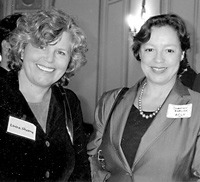
Linda Sherry of Consumer Action (left) with Dorothy Erlich of the American Civil Liberties Union of Northern California. New Economics for Women (NEW) of Los Angeles, for its emphasis on the importance of financial literacy. NEW works with single parents and their families to help them attain economic self-sufficiency. The organization is also a developer of affordable housing for women and children in need.
CA Community Consumer Advocate Guadalupe Aguilar presented the award to Bea Stotzer, NEW Board President.
Aguilar noted that NEW’s approach encompasses client-driven housing design as well as a creative infrastructure with on-site customized family, educational and job training services.
“This helps working poor families break the cycle of poverty and improve their standard of living within three to five years so they can move from subsidized housing to home ownership,” said Aguilar.The Sturdevant Law Firm & Trial Lawyers for Public Justice (TLPJ), for their successful challenge of AT&T’s mandatory arbitration clause in the Ting vs. AT&T case.
The Sturdevant Law Firm (www.sturdevantlaw.com), based in San Francisco, specializes in class litigation on behalf of plaintiffs involving unlawful, unfair and fraudulent business practices and consumer protection.
TLPJ (www.tlpj.org), based in Washington, DC, is a public interest law firm dedicated to using trial lawyers’ skills and resources to advance the public good. Founded in 1982 at Ralph Nader’s urging, TLPJ uses a national network of outstanding trial lawyers to pursue precedent-setting and socially significant litigation.

Karen Hindin of The Sturdevant Law Firm with her husband, Jeremy Pasternak of The Dolan Law Firm.
McEldowney, who presented the award to James Sturdevant and Kate Gordon of TLPJ, noted: “Because of the untiring efforts of The Sturdevant Law Firm and TLPJ, consumers won a precedent-setting ruling that AT&T’s high-handed attempt to force customers to settle disputes through binding arbitration was illegal, unconscionable and unenforceable.”
CA invites you to mark your calendar for next year’s party, which will be held on Wednesday, June 9, 2004 at the Marine’s Memorial Club, 609 Sutter St., San Francisco.
Inquiries about this event can be addressed to Linda Sherry by phone at (415) 777-9635 or by e-mail at .(JavaScript must be enabled to view this email address).
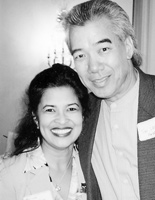 |
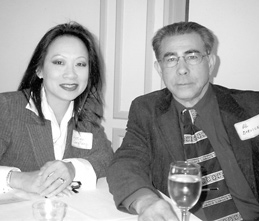 |
| Marissa Castro-Salvati of Southern California Edison and Tim Leong of PG&E. | Hatien Contang-Nguyen of Washington Mutual and Al Borvice of Housing Development & Neighborhood Preservation Corporation. |
 |
 |
| From left: Laurel Pallock of the San Francisco District Attorney’s Office and Sandy Lee and Louise Hagstrom of KRON-TV. | Longtime Consumer Action supporters and volunteers Ellis and Jennifer Cross Gans. |
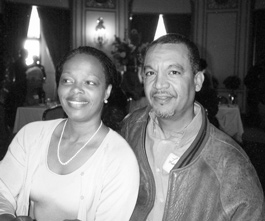 |
|
| Kelly Armstrong, owner of Artist Development/ImageMaking in San Francisco, and Lionel Armstrong. |
|
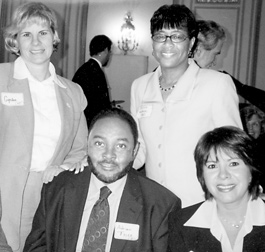 |
 Consumer Action Executive Director Ken McEldowney greets guests. |
From left: Cynthia Wales, Adrian Tyler, Cynthia Marshall and Ileana Winterthalter, all of SBC. |
Below: Kathy Li of Consumer Action (left) with Jamie Woo of the Chinese Newcomers Service Center of San Francisco.  |
| Corporate Gifts Inner Circle AMD Consumer Advisory Initiative PG&E SBC Communications United Parcel Service - UPS Washington Mutual Benefactors American Express Capital One Issue Dynamics, Inc. Microsoft PacifiCare Providian Sprint Verizon Sponsors MasterCard International The Sturdevant Law Firm |
Friends California Payphone Association Jim Conran, Consumers First, LLC The Cuneo Law Group Experian The Gas Company, A Sempra Energy Utility Hulett Harper LLP Individual/Community Silver Circle Judith R. Rosenberg Benefactors James Beck, Haight Ashbury Free Clinics Trish Butler, Sage Communications Marsha Cohen Gene Coleman Robert C. Friese Jenkins & Mulligan Arthur Levy Rich Sayers, 1010PhoneRates.com Thomas Schrag Steven Solomon Patricia Sturdevant |
Sponsors Al Borvice Susan Clark, Common Knowledge Consumers Union CSSARA Walter McEldowney Friends Candace Acevedo Amy Bach, United Policyholders Chris Bjorklund F. Paul Bland Gerri Detweiler, Ultimate Credit Solutions Ellis and Jennifer Cross Gans John Geesman Linda Golodner Julia Ling, Chinese Newcomers Service Center Martin Mattes Audrey Moy Kay Pachtner Time Advertising Inc. Jonas Waxman |
Looking for a date on the Internet? Tread carefully
By Gina Baleria
As online dating becomes socially acceptable, many singles are losing their inhibitions about participating. More than 16.3 million people visited online personals sites during 2002, according to Jupiter Research.
In a CBS News poll earlier this year, 24% of respondents said they think that the Internet is a good way to meet people. The poll found that 28% of all unmarried respondents with Internet access had visited a dating site.
But experts advise people to be careful about using such services. From choosing an online dating service to posting a profile to meeting someone you contacted online face-to-face, online dating requires a careful and common-sense approach.
While there are thousands of places to meet people on the Internet, a handful of sites dominates the industry. One is Match.com, a national site which allows regional searching. It claims nearly 800,000 paying subscribers and more than 8 million profiles of people who have placed free postings. The site is owned by IAC/Interactive Corp, an interactive commerce company that also owns Expedia travel site, Home Shopping Network, TicketMaster and Lending Tree.
Some sites focus on religion or culture, such as Jdate.com, a dating service for Jewish singles. The site boasts 500,000 registered members and says that the majority of its members have a professional degree and an average income of more than $60,000 year.
Eharmony.com matches people using a 500-question personality profile. Its founder, Dr. Neil Clark Warren, a Pasadena, California clinical psychologist, says he is an expert on “singles’ issues, mate selection, and developing healthy relationships.” Visitors to the site can fill in the questionnaire for free and are provided with preliminary matches before signing up for membership, which costs up to $249 per year.
A good site will feature plenty of information about the company and its policies and allow you a free trial visit. (You may have to register to get the free trial.) When evaluating sites, try to find answers to these questions:
Does the site offer matches with people who live in your area? .
Do the people who have posted on the site interest you?
-
Does the site include postings from people in your age or demographic group?
-
Do membership requirements seem fair?
-
Does the company share your name and e-mail address with marketers? If so, does it give you the opportunity to opt out of marketing?
Many states have laws that allow you to cancel written contracts for dating services (and other goods or services) within three days for any reason, or for no reason. When you sign up for membership in an online dating service, you should be given information about your right, if any, to rescind the contract. In general, your notice of cancellation must be in writing and be postmarked within the proper time period. As a safeguard, keep a copy of your letter with a note of when, where and to whom you mailed it.
Before paying for a dating service, run the name by your local Better Business Bureau (www.bbb.org). Patrick Walsh of the Golden Gate Better Business Bureau serving the San Francisco Bay Area in California, said the agency gets a lot of complaints about online dating services, many of which “have unsatisfactory records with us.”
Walsh said that the complaints center on services that aren’t delivered and on the amount of fees that are charged. “Up-front fees go all the way from $25 to $50 a month to $2,000 or $3,000,” said Walsh. ”Many services offer a certain number of matches or meetings that don’t come through.”
Walsh suggests you ask what will happen if you don’t meet anyone. A reputable company will be prepared to provide a whole or partial refund if you are not pleased with the service.
Some online sites feature testimonials with glowing reports from “Donna M.” or “George P.”
“Don’t buy the testimonial nonsense,” recommends Walsh. “Who are these people? They might be completely made-up?”
Be safe, not sorry
Most people are understandably cautious when they meet strangers in person—online dating should be no different. In addition, it’s easier for people to lie about themselves online.
Most dating services operate as a third party, allowing users to communicate through the service, rather than using their personal e-mails. If you begin to communicate with someone, take things slow. When communicating with a potential date online, be cautious about sharing personal information, such as your address or job. Take note of inappropriately intimate comments. As one online advice columnist puts it, “There are nutters out there!”
Trish McDermott of Match.com offers these “red flags” that a potential date might be trouble:
- Fails to provide direct answers to direct questions.
- Provides inconsistent information about age, interests, appearance, marital status, job, etc.
- Gives excuses about why he/she can’t send a photo.
- Pressures you for a face-to-face meeting or personal details.
If you decide to talk on the phone with someone you meet on the Internet, block your home phone number to Caller ID or make the call from a public pay phone.
Above all, use common sense and trust your instincts. If it doesn’t feel right for some reason or if someone makes you uncomfortable, stop right there.
| Safe dating tips |
| Choose your service carefully Check out the company with the Better Business Bureau. Look for information on the site about the company’s physical address, history and ownership. Be suspicious of high pressure sales and steer clear of companies that charge exorbitant fees. |
| Restrict personal information Never post personal information on the Internet that could be used to identify you or find out where you live. Don’t provide your last name, e-mail address, home address, phone number or place of work. |
| Be safe when you meet Arrange to meet in a public place that you are familiar with. Let a friend or family member know about your plans. Consider asking a friend to come with you. |
Getting help
If you are threatened or harassed by someone you meet through a dating service, call the police immediately.
If you believe that a company has not fulfilled its obligations, contact the company to complain. If that doesn’t work, turn to the Better Business Bureau or the Federal Trade Commission (FTC) (www.ftc.gov). These agencies cannot help you recoup your costs, but your complaint will help them warn other consumers. The FTC does not act on individual complaints, but may take action if it receives numerous complaints about one company.
In 1995, the FTC sued the Great Expectations dating service for violations under the federal Truth-in-Lending Act. The FTC charged that the national chain failed to tell customers about finance charges on its membership fees. The company settled the case by agreeing to make $200,000 in refunds.
You can also complain to your county or city district attorney’s consumer fraud unit. The San Francisco DA’s office charged Table for Six, a locally based dating service, with failing to let consumers know about their right to a three-day cancellation period as provided by California law.
San Francisco DA’s Consumer Fraud Investigator Laurel Pallock recommends that you write down the name and contact information for the person who signs you up for the service. If you sign up online, save all e-mails and other communications about the agreement. Pallock said that this information can help law enforcement investigate your complaint.
“They don’t live up to their agreement,” said Pallock. “If they promise you a certain number of dates, or agree to match you only with a certain age group, and that never happens, then you have a valid complaint.”



